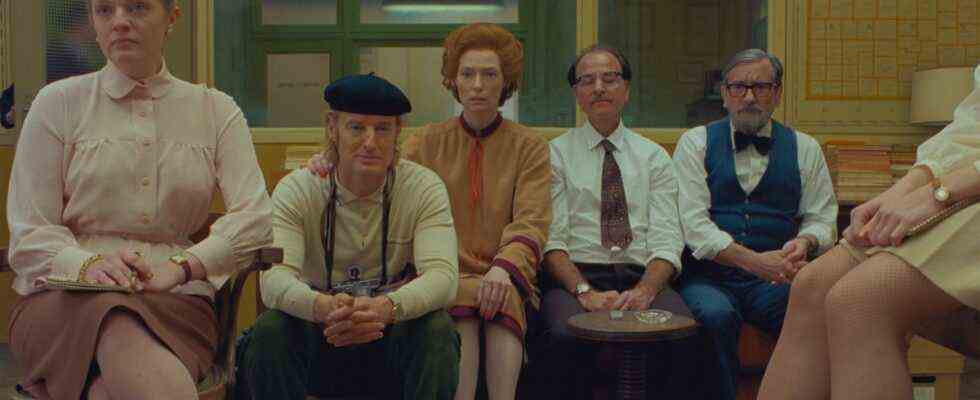You can’t think about it all the time during these summer cinema days, but of course this Corona-Cannes is also a risk. When, for example, the news comes that the French actress Léa Seydoux tested positive for the virus despite being vaccinated, still in Paris, and will probably not appear on the red carpet now. Or in the daily mass tests of the visitors, for which there are definitely positive results.
Could a possible surge in numbers lead to abandonment? Rumors like that are buzzing around, but that seems unlikely, because the French love for cinema above all else. For example, it ensures that the halls are packed full in a dense premiere atmosphere, with no spacing rules in the rows of seats. And that a young Russian critic, who risked the journey from Moscow via Greece despite the quarantine obligation, can report at the café in the press center about an officer at the airport who closed both eyes so as not to ruin her participation in Cannes.
At the festival there was finally “The French Dispatch”, the new film by Wes Anderson. It was supposed to open Cannes a year ago, but because the 2020 edition was canceled, the director decided to wait. Nowhere else than on the Croisette was its world premiere – and you understand why after the first few minutes of the film. The film is a satirical, but consistently loving homage to everything French, seen through American eyes, practically starred down to the smallest supporting role. And above it all hovers the as always indispensable Bill Murray.
Tilda Swinton plays an art critic who also sees herself as the erotic muse of her protagonists
He plays a wanderlust-plagued publisher’s son from deepest Kansas, who one day decided to publish the color supplement for his parents’ provincial newspaper from France without further ado, and has found a new home in the metropolis of Ennui-sur-Blasé, which is rich in detail in its retro quirkiness wonderfully comes to life here. So he did The French Dispatch created a magazine that in design and cosmopolitan eccentricity strongly resembles the ones loved by Wes Anderson new Yorker reminds – and employs a number of unbeatable noble pens, some of which are based on real ones new Yorker-Writers based.
Who wouldn’t want to be editor-in-chief when the cycling street poet Herbsaint Sazerac (Owen Wilson) delivers his impressions of the city? Or the extravagant art critic JKL Berensen (Tilda Swinton), who sees herself not only as an art judge, but also as the erotic muse of her protagonists? Or Lucinda Krementz (Frances McDormand), the die-hard reporter with the ultra-left ideas who sometimes co-wrote the manifesto of a sexy student revolutionary (Timothée Chalamet), about which she is supposed to report? Murray accepts her personal and stylistic peculiarities with a deep and fateful love. Only sometimes does he throw in a suggestion for amendment, which of course immediately makes the text much better.
Oh yes, the man makes an absolute sheet of dreams, and he is a dream boss for everyone who writes. The love for texts and the work on them permeates the entire film. The reports in the voice-over are also read out in parts, but so quickly that you can hardly appreciate their subtleties. Soon you will want to put the whole film down like a beloved magazine issue that you can pull out again and again and browse through it.
At the same time as the texts, of course, one also sees the most varied of worlds that they describe – and is then placed, for example, in the studio of the demonic disheveled painter Moses Rosenthaler (Benicio del Toro), who has placed a naked female model on a pedestal and is in portrayed in wild abstraction. On closer inspection, the nude turns out to be Léa Seydoux, already mentioned above, and the way the painter approaches her and paints dots of color on her stomach reminds one of old clichés of artistic-erotic power inequality. Until the model simply knocks the paintbrush out of the painter’s hand.
Then the whole scene is reversed, the naked woman slips into a neat uniform with a beret and turns out to be a prison guard, then she brings the painter back to his cell. Rosenthaler is serving life as a double murderer in Ennui-sur-Blasé. It is in such surprises that Anderson’s inexhaustible inventiveness is shown again and again. There is not enough space here for all the intricacies that follow, let alone the wild stories of the other episodes. Ultimate test question 2021: If you had a fifty-fifty chance to either see this film immediately or to have to be quarantined for ten days, would you dare to play the game? In the case of “The French Dispatch” the answer is clearly yes.

